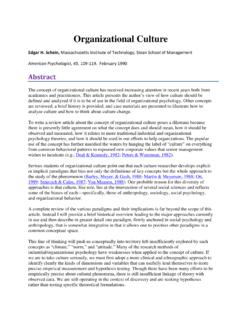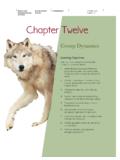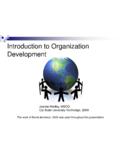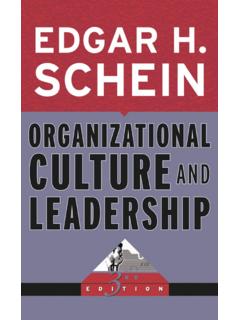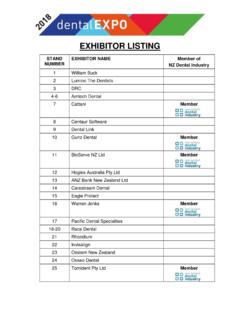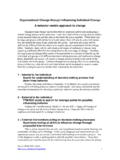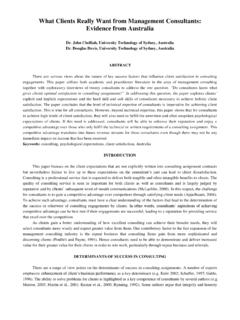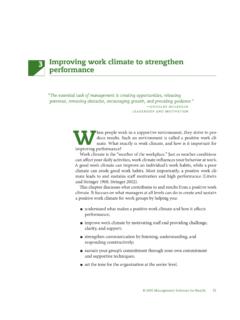Transcription of Process Consultation and the Helping Relationship …
1 Process Consultation and the Helping Relationship in PerspeProcess Consultation RevisitedBuilding the Helping RelationshipEdgar H. schein Process Consultation and the Helping Relationship in Perspective In this chapter I want to summarize, comment on and reflect on what has come before. Some of the questions I want to address were stimulated by the detailed feedback from my colleague, Otto Scharmer and his wife Katryn who read the manuscript carefully and thoughtfully. I am grateful for their suggestions. I also benefited greatly from the reviews of four colleagues Dick Beckhard, Warner Burke, Michael Brimm, and David Coghlan.
2 Their thoughts and suggestions have been incorporated into this volume and have strengthened it greatly. What then is to be said in a concluding chapter? First, I want to revisit the ten principles of Process Consultation because I find them increasingly helpful as a diagnostic of where I have gone wrong when things do not work out as I expected them to. Then, I want to take up some remaining issues, especially pertaining to the teaching of Process Consultation . Ten Principles as the Essence of Process ConsultationIn reflecting on Process Consultation and the building of a Helping Relationship , the question arises: where is the emphasis or the essence that makes this philosophy of Helping different ?
3 Why bother to learn all of this stuff. In my reflections on some 40 years of practicing this stuff, I have concluded that the essence is in the word Relationship . To put it bluntly, I have come to believe that the decisive factor as to whether or not help will occur in human situations involving personality, group dynamics, and culture is the Relationship between the helper and the person, group, or organization that needs help. From that point of view, every action I take, from the beginning contact with a client, should be an intervention that simultaneously allows both the client and me to diagnose what is going on and that builds a Relationship between us.
4 When all is said and done, I measure my success in every contact by whether or not I fell the Relationship has been helpful and whether or not the client fells helped. Furthermore, from that point of view, the principles, guidelines, practical tips, call them what you like, fall-out as the kinds of that kind of Helping Relationship . Let us review the principles from that point of Always try to be , if I have no intention of being helpful and hardworking at it, it is unlike to lead to a Helping Relationship . I have found in all human relationships that the intention to be helpful is the best guarantee of a Relationship that is rewarding and leads to mutual Always stay in touch with the current cannot be helpful if I cannot decipher what is going on in myself, in the situation, and in the file:///C|/Documents%20and%20 Settings/peter/My% (1 of 6)17/02/2009 07:55.
5 52 Process Consultation and the Helping Relationship in Access your only way I can discover my own inner reality is to learn to distinguish what I know from what I assume I know, from what I truly do not know. And I have learned from experience that it is generally most helpful to work on those areas where I truly do not know. Accessing is the key, in the sense that I have learned that to overcome expectations and assumptions I must make an effort to locate within myself what I really do not know and should be asking about. It is like scanning my own inner database and gaining access to empty compartments.
6 If I truly do not know the answer I am more likely to sound congruent and sincere when I ask about Everything you do is an as every interaction reveals diagnostic information, so does every interaction have consequences both for the client and me. I therefore have to own everything I do and assess the consequences to be sure that they fit my goals of creating a Helping It is the client who owns the problem and the job is to create a Relationship in which the client can get help. It is not my job to take the client s problems onto my own shoulders, nor is it my job to offer advice and solutions in a situation that I do not live in Go with the as I do not know the client s reality, I must respect as much as possible the natural flow in that reality and not impose my own sense of flow on an unknown situation.
7 Once the Relationship reaches a certain level of trust, and once the client and helper have a shared set of insights into what is going on, flow itself becomes a shared Timing is and over I have learned that the introduction of my perspective, the asking of a clarifying question, the suggestion of alternatives, or whatever else I want to introduce from my own point of view has to be tined to those moments when the client s attention is available. The sane remark uttered at two different tines can have completely different Be constructively opportunistic with confrontive the client signals a moment of openness, a moment when his or her attention to a new input appears to be available, I find I seize those moments and try to make the most of them.
8 In listening for those moments, I find it most important to look for areas in which I can build on the client s strengths and positive motivations. Those moments also occur when the client has revealed some data signifying readiness to pay attention to a new point of Everything is a source of data; errors are inevitable-learn from matter how well I observe the previous principles I will say and do things that produce unexpected and undesirable reactions in the client. I must learn from them and at all costs avoid defensiveness, shame, or guilt, I can never know enough of the client s really to avoid errors, but each error produces reactions from which I can learn a great deal about my own and the client s When in doubt share the :///C|/Documents%20and%20 Settings/peter/My% (2 of 6)17/02/2009 07:55:52 Process Consultation and the Helping Relationship in PerspeInevitably, there will be times in the Relationship when I run out of gas, don t know what to do next, feel frustrated, and in other ways get paralyzed.
9 In situations like this, I found that the most helpful thing I could do was to share my problem with the client. Why should I assume that I always know what to do next? Inasmuch as it is the client s problem and reality we are dealing with, it is entirely appropriate for me to involve the client in my own efforts to be helpful. These principles do not tell me what to do. Rather, they are reminders of how to think about the situation I am in. They offer guidelines when the situation is a bit ambiguous. Also they remind me of what it is I am trying to do. Can One Develop a Useful Typology of Interventions?
10 In previous versions of this book I attempted to categorize interventions. As I reflect on possible ways to do this, I have concluded that such categories are not really useful because they divert one from the more fundamental question of figuring out what will be helpful at any given moment in the evolving Relationship . I prefer a general concept of Facilitative Intervention that implies that the consultant should always select whatever intervention will be most helpful at any given moment, given all one knows about the total situation. Certainly the consultant should be familiar with a variety of questions, exercises, survey-feedback technologies, and other forms of intervention many of which have been illustrated in the previous chapters and well described in other books on organization development.
